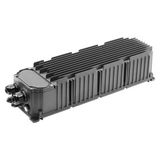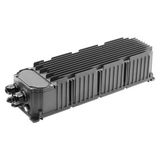GEWISS Controllers for luminaires
In modern lighting systems—whether office upgrades, warehouse retrofit, outdoor street lighting or smart building infrastructure—the controller behind the lights is just as important as the luminaire itself. The category of GEWISS controllers for luminaires covers dimming modules, DALI systems, motion/presence sensors and daylight controls: devices that convert standard lighting into a controllable, efficient system. From my field experience: specifying the right lighting control unit early prevents costly rewiring or bypass later and delivers energy savings that matter on real invoices.
GEWISS Lighting Control Units — Core Modules for Dynamic Light Management
When you’re implementing lighting systems that respond to occupancy, daylight or scheduling, you’ll select GEWISS lighting control units as the core modules. These include programmable units capable of interfacing with DALI, 0‑10 V, relay outputs or bus systems. They form the logic between sensor inputs and luminaire outputs. The benefit: you map zones, set scenes, schedule off‑hours and integrate with building management systems.
GEWISS Dimming Controllers & Smart Lighting Controllers — Precision and Flexibility
For installations where brightness, light‑scene or energy‑saving are key (for example in gyms, offices, high‑bay warehouses), you’ll use GEWISS dimming controllers or GEWISS smart lighting controllers. These modules let you adjust light levels, form groups, tie into sensors, and often provide remote monitoring or diagnostics. The field reality: if you only install on/off switches, you’ll miss out on measurable savings and future‑proofing; with dimming you open the path to LED upgrades and responsive lighting.
GEWISS Motion and Presence Sensors & Daylight Control Modules — Inputs to the Control System
To feed your control units you need inputs: GEWISS motion and presence sensors for detecting occupancy and GEWISS daylight control modules for ambient‑light monitoring. These sensors trigger actions: when no one is in the room, the control unit dims or switches off lights; when ambient daylight is sufficient, the system reduces output. In practical installation, pairing the right sensor with the controller reduces false trips, avoids glare issues and improves compliance with energy codes.
Procurement Insights for Wholesale Buyers
When procurement teams specify GEWISS controllers for luminaires and related lighting control modules in volume, they typically compare:
- Control unit compatibility (DALI, 0‑10 V, relay, bus) vs luminaire drivers and building system
- Ratings: number of channels, per‑channel current, override capacity, scheduling
- Sensor type and coverage: motion vs presence, field of view, ambient daylight range
- System integration: ability to integrate with BMS, IoT, data monitoring or cloud analytics
- Stock and lead‑time: control systems often appear late in the lighting project schedule—delays can stall zone commissioning
- Brand ecosystem: using GEWISS across controllers, sensors and modules gives unified installation footprint, spares, interface logic and documentation
From experience: I’ve seen lighting projects delayed because sensors or control modules were mismatched; choosing a single‑brand system simplifies spares, training and service.
Closing Note on European Supply
Bank of Lamps supplies the full range of GEWISS controllers for luminaires—lighting control units, dimming controllers, DALI modules, motion/presence sensors, daylight control modules and smart lighting controllers. Our central warehouse in Latvia allows delivery across the UK, Germany, Netherlands, Baltics, France, Spain and Belgium for B2B clients, system integrators and electrical contractors. With bulk order flexibility, consistent stock and logistics built for professional installations, you can focus on the project — not chasing missing parts.
![SMART [PRO] e - DRIVER BOX - 1-10V - 4 MODULES](https://image-cdn.bankoflamps.com/160x160/b8/b8d1a3509edc5a87fc6d7e1cb8d2cabf9f966240.jpg)
![SMART [PRO] e - REMOTE SUPPLY UNIT - 1-10V - 2 MODULES](https://image-cdn.bankoflamps.com/160x160/1c/1c4c9b8f550672ae4b2258a012f46a3b3db29ce1.jpg)


![REMOTE SUPPLY UNIT - SMART [PRO] 2.0 - 2+2 MODULES](https://image-cdn.bankoflamps.com/160x160/a6/a68e8ecc73cb2553ce6fb50610eb386ca15a8e3a.jpg)